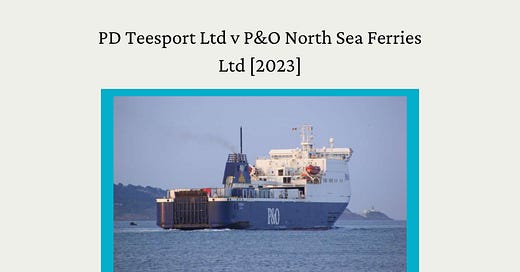PD Teesport Ltd v P&O North Sea Ferries Ltd [2023]: Force Majeure and Commercial Certainty
Prachi Dahiya
The case of PD Teesport Ltd v P&O North Sea Ferries Ltd [2023] EWHC 857 (Comm) offers a significant examination of contractual obligations and the application of force majeure defences, particularly in the context of economic disruptions caused by Brexit and the COVID-19 pandemic. The judgment reaffirms the principle that commercial contracts must be interpreted with precision, and that force majeure clauses will not easily excuse performance unless the conditions they prescribe are strictly met.
Background and the Dispute
PD Teesport Ltd, the operator of Teesport in Teesside, entered into an agreement with P&O North Sea Ferries Ltd, effective from January 2021, requiring P&O to import or export a minimum of 120,000 units annually through the port. Any shortfall triggered a contractual penalty of £44.54 per unit. However, in 2021, P&O fell short of this requirement, transporting only 99,550 units and resulting in a deficit of 20,450 units. PD Teesport subsequently demanded a shortfall payment of £910,843 plus interest. P&O did not contest the shortfall but argued that it was excused from liability due to economic disruptions from Brexit and the pandemic, which it claimed fell within the contract's force majeure provisions.
The Key Contractual Clauses
The dispute centred on two clauses. Clause 11.3 provided that if P&O could demonstrate to PD Teesport’s reasonable satisfaction that the failure to meet the minimum volume was due "solely" to economic factors caused by Brexit, the parties would engage in discussions and consider adjusting the requirement. Clause 12.3, meanwhile, stated that if a force majeure event affecting PD Teesport prevented P&O from meeting its obligations, the relevant units would be deducted from the minimum volume guarantee.
Court’s Analysis and Judgment
The High Court, presided over by HH Judge Klein, granted summary judgment in favour of PD Teesport, rejecting P&O’s defences. On Clause 11.3, the court found that P&O had failed to provide sufficient evidence demonstrating that Brexit was the sole cause of its failure to meet the volume requirement. Furthermore, PD Teesport had engaged in discussions with P&O, and there was no clear indication that it acted in bad faith or unreasonably refused an amendment to the contract. The court held that P&O had not established that COVID-19 had affected PD Teesport in a way that prevented P&O from fulfilling its contractual obligations. Force majeure clauses are interpreted strictly, and P&O’s assertion that the pandemic had a general economic impact was insufficient to meet the specific wording of the contract.
Implications for Commercial Contracts
The ruling underscores several critical principles for commercial entities relying on force majeure or economic hardship defences. First, the evidential burden rests on the party invoking the clause, requiring clear proof of a causal link between the claimed force majeure event and the failure to perform. General disruptions caused by events like Brexit or the pandemic will not suffice if the contract demands more specific conditions. Second, contractual precision is paramount. Courts will closely analyse the wording of force majeure provisions and will not extend their scope beyond what is expressly agreed. Finally, good faith discussions, while essential, must be substantiated with clear evidence. Mere allegations of a lack of engagement or bad faith will not succeed without supporting documentation.
Lessons for Businesses
This case highlights the importance of drafting contracts with clear and detailed force majeure provisions, particularly in times of increasing global economic volatility. Businesses must ensure that their contracts explicitly define the scope of force majeure events and the conditions under which they may be invoked. By proactively addressing potential economic or operational disruptions within the contract itself, parties can avoid litigation and ensure greater commercial certainty. Ultimately, PD Teesport Ltd v P&O North Sea Ferries Ltd serves as a stark reminder that force majeure is not a blanket escape from contractual obligations; it is a narrowly construed mechanism that must be precisely applied.



